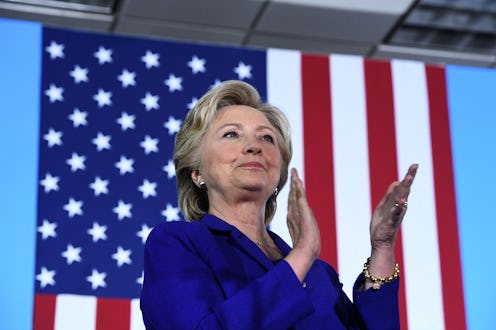News
This Many People Total Voted For Hillary Clinton
After a long presidential campaign, the votes are in. The first female presidential nominee may have gotten 228 electoral votes, but how many individual votes did Hillary Clinton get?
There is a difference between electoral votes and the popular vote. In both 2008 and 2012, President Obama won at least 51 percent of the popular vote, but he won around 62 percent of the Electoral College votes. This discrepancy exists due to the "winner takes all" system of the Electoral College — 48 states and the District of Columbia allocate all of their electoral votes to the candidate who wins the most individual votes within the state. On the other hand, Maine and Nebraska proportionally allocate their electoral votes. The last president to get 51 percent or more of the popular vote other than Obama was President Eisenhower, who did so in both 1952 and 1956. Clinton eventually received 59.8 million individual votes, beating electoral vote victor Donald Trump's 59.6 million individual votes.
As this election showed us, it is possible to win the popular vote but not the presidency. This isn't the first time either; during the 2000 presidential election, Democrat Al Gore won the popular vote, but lost the presidency to George W. Bush by five electoral votes. The Electoral College system has inspired controversy for reasons such as Gore's loss, but others argue that the system protects the rights of smaller states that would otherwise be overshadowed by states with larger populations.
The election has been a wild ride from start to finish, with the advent of Trump and his 2005 hot mic tape, Bernie Sanders challenging Clinton for the Democratic nomination, and the Clinton emails, among other notable moments. Several previously staunchly partisan states became battleground areas, including Utah and Texas, where in 2012 Republican candidate Mitt Romney won by 48 percentage points and 16 percentage points respectively. And third-party, Independent candidate, Evan McMullin showed signs of becoming the first non-major party candidate to win a state since 1968. This would have lead to an Electoral College deadlock, meaning the House of Representatives would have to select the next president.
Clinton had previously won the popular vote during her unsuccessful primary run in 2008, the Washington Post reported. Still her opponent, Obama, won more pledged delegates and superdelegates, leading to his eventual securing of the Democratic nomination. During the 2016 Democratic primaries, Clinton won 2,807 delegates to her opponent Sen. Bernie Sanders' 1,893 delegates, a hefty amount more than the 2,382 delegates needed to secure the nomination. But in the final election, the electoral college didn't lean her way.
